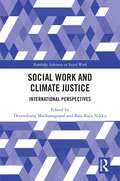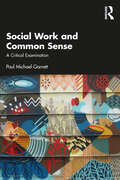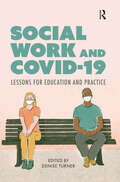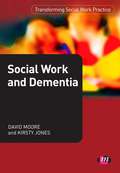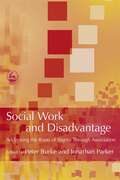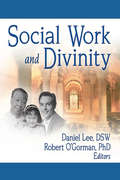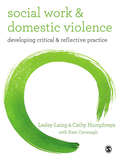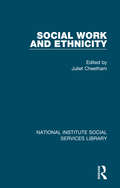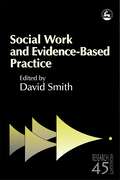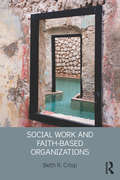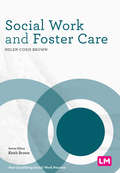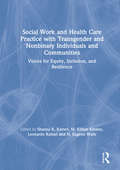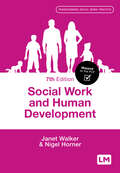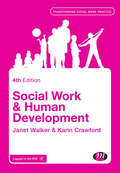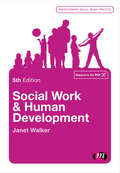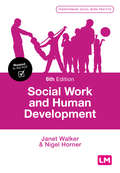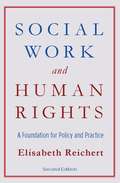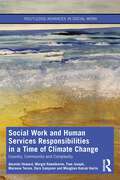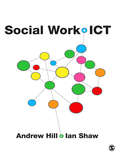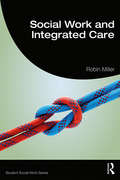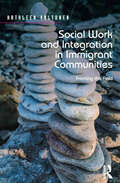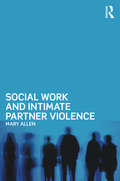- Table View
- List View
Social Work and Climate Justice: International Perspectives (Routledge Advances in Social Work)
by Devendraraj Madhanagopal Bala Raju NikkuThis book argues that climate justice is an urgent and defining global challenge with long-term implications for poverty reduction, livelihoods, community well-being, and sustainable development. It provides a thorough overview of both fundamental and new directions of knowledge and policy directions in this less debated area within environmental social work. The chapters of this book offer both global and cross-country perspectives via case studies from India, Nepal, Ukraine, South Africa, and the USA, providing greater understanding, evidence, and strategies to achieve the resilience of vulnerable communities based on climate justice principles. It will be required reading for all scholars, students, and social work professionals as well as those working in sustainability and community development.
Social Work and Common Sense: A Critical Examination
by Paul Michael GarrettRooted in a lively, critical approach to social work education and practice, Social Work and Common Sense challenges readers to think critically and more deeply about core facets of social work knowledge and ‘received ideas’. Garrett draws on the work of Antonio Gramsci to develop new, and often provocative, insights on attachment theory, creativity, anger, human rights, the ‘unmarried mother’ in Ireland’s past, and contemporary approaches to ‘decolonising’ social work education. The book is divided into ten chapters, each of which includes a series of reflection and talk boxes to assist students to critically reflect (individually and in class/seminar and fieldwork/workplace discussions) on key facets of the preceding chapter.Addressing often complex ideas in a freshly accessible way, Social Work and Common Sense will be required reading in all postgraduate and advanced undergraduate classes in theory and social work.
Social Work and Covid-19: Lessons for Education and Practice
by Denise TurnerCaptures the unique moment in time created by the Covid-19 pandemic and uses this as a lens to explore contemporary issues for social work education and practice. The 2020 coronavirus pandemic provided an unprecedented moment of global crisis, which placed health and social care at the forefront of the national agenda. The lockdown, social distancing measures and rapid move to online working created multiple challenges and safeguarding concerns for social work education and practice, whilst the unparalleled death rate exacerbated pre-existing problems with communicating openly about death and bereavement. Many of these issues were already at the surface of social work practice and education and this book examines how the health crisis has exposed these, whilst acting as a potential catalyst for change. This book acts as a testament to the historical moment whilst providing a forum for drawing together discussion from contemporary educators, practitioners and users of social work services.
Social Work and Dementia (Transforming Social Work Practice Series)
by David Cooper Moore Kirsty JonesThis practical book enables those already practicing or joining social work to consider the various ways that people can be supported to live well with dementia. Areas focused on include how the personalisation agenda is changing services through self-directed support, re-enablement and telecare, how risk can be managed while choice and independence are maintained, and how safeguarding of people with dementia can be positively practiced. The authors present information on essential new developments in the field of dementia care including changes in legislation and Government policy as well as providing examples of positive practice from around the country.
Social Work and Disadvantage: Addressing the Roots of Stigma Through Association
by Jonathan Parker Peter BurkeThis book is a guide to understanding the important issue of stigma - `associated disadvantage' - which affects not only those who are excluded from society, but also family members and friends. Social Work and Disadvantage explains the impact of stigmatization on siblings, families and workers in the caring professions and its consequences for the people it affects and for society as a whole. Contributors provide evidence from research and professional practice on transferability of health and social problems in, for example, dementia care patients, drug users and looked after children. Providing key messages for practice, they outline a range of protection measures to reduce the risk of stigma and victimization. Social Work and Disadvantage provides valuable advice and guidance for social work and health care practitioners, educators and students.
Social Work and Disasters: A Handbook for Practice
by Margaret Alston Tricia Hazeleger Desley HargreavesDisasters are increasing in frequency and intensity across the world, causing significant destruction to individuals and communities. Yet many social workers are ill-prepared for the demands of this field of practice. This book discusses the role of social workers in disaster work, including in disaster-preparedness, during the disaster and in post-disaster practice. It addresses the complexities of social work disaster practice, noting the need for social workers to understand the language of trauma and to respond effectively. The authors discuss disaster theory and practice, drawing out elements of practice at macro-, meso- and micro-levels and at various stages of the disaster. They examine the factors that shape vulnerability in disasters and draw out the possibility of post-traumatic growth. The final section discusses strategies for self-care in disaster practice, noting the organisational and personal strategies that can be adopted to facilitate the wellbeing of workers in the field. With real-life case studies from top scholars in the field, this book is essential reading for social work practitioners working in the field of disaster practice, as well as social work students and academics. It will also be useful to other health professionals who wish to understand this field of practice.
Social Work and Divinity
by Daniel Lee Robert O'Gorman Frederick L Ahearn JrThe milestone text integrating the disciplines of social work and divinity!In everyday life, spirituality and the practice of effective social work are inseparable. As a result, professionals and social service administrators have in recent years felt a stronger obligation to attend to the spiritual needs of clients. Social Work and Divinity examines the potential of integrating the disciplines of social work with divinity to achieve positive results in practice while answering spiritual concerns. Internationally respected scholars from diverse religious and ethnic backgrounds discuss the academic as well as the practical issues involved in the establishment and growth of dual degree programs. Social Work and Divinity comprehensively explores both the theoretical and the practical foundations of joint professional education and practice for social work and divinity dual degree programs. The book provides suggestions that will guide educators, practitioners, administrators, and students to develop spiritually sensitive approaches to counseling people. Emerging human needs are explored, along with the challenges inherent in the multiple roles a counselor must adopt when developing an interdisciplinary approach. Well-reasoned, insightful, thoroughly referenced, empirically reinforced with tables, this is an essential text sure to become a choice educational reference.Social Work and Divinity discusses: the role of religion and spirituality in clinical social work the challenges for students integrating the curriculums of social work and divinity the collaboration to respond to the broader demands of emerging human needs the empirical evidence advocating the benefits of dual degree programs the challenges for educational institutions adopting dual degree programs in social work and divinity the formation of a professional identity in dual degree training and supervision the issues of teaching about organized religion in social work practical advice on integrating religion and social work the role of faith and spirituality in social work educationSocial Work and Divinity is a milestone textbook for graduate schools of social work and divinity and an essential resource for students and faculty involved in each discipline or in dual degree programs.
Social Work and Domestic Violence: Developing Critical and Reflective Practice
by Lesley Laing Cathy Humphreys Kate CavanaghDomestic violence affects all areas of social work. This book shows how social workers can intervene in everyday practice with victims, their families and perpetrators of domestic abuse. It provides students with knowledge of theory, research and policy to put directly in practice across a variety of legal and service-user contexts. Topics covered include: Child protection Interprofessional collaboration The policy and legal context Working with women Working with men Each chapter begins with a case study and concludes with reflective questions to highlight practice dilemmas and challenge students to reflect critically. Further reading from a rich range of sources guides readers to expand their knowledge. This book will be valuable reading for students studying domestic violence, child protection, and family social work, as well as practitioners of Social Work.
Social Work and Ethnicity (National Institute Social Services Library)
by Juliet CheethamOriginally published in 1982 Social Work and Ethnicity was the first purpose-written text for social work students, administrators and practitioners designed to prepare them conceptually and practically for work in Britain’s established ethnic minority communities. Much more than the vicissitudes of immigration now had to be considered: this book discusses social work’s response to chronic racial discrimination and disadvantage and the hazards and advantages of taking ethnicity into account in service delivery. Emphasised throughout is the role of the social services in promoting good race relations and a better deal for black people. Social Work and Ethnicity is based on research carried out by Mrs Cheetham and sponsored by the DHSS to identify the major concerns of social workers with ethnic minority clients and to study the development of relevant services in Britain and the USA. The contributing authors are mainly practitioners and come from a wide variety of ethnic backgrounds; in fact, this is the first book on social work to be published in Britain to which a substantial contribution has been made by black writers. The specially commissioned contributions discuss the fundamental questions of principle in giving special consideration to ethnicity and underline the implications for practice. In particular, the lessons which Britain can learn from American experience are reviewed. The book opens with a discussion of political and ethical questions; the problems of assessing need and monitoring services are then examined. This is followed by several chapters on the special needs of various ethnic minority client groups, particularly children and young people, who now deserve priority attention. The tricky issue of ethnic matching is discussed, so too are the different methods of developing services which are appropriate to ethnic minority needs and aspirations. Recruitment, training and education for work in a multi-racial society are subjects for several chapters and the book concludes with the experiences of two ethnic minority social workers. This book is a re-issue originally published in 1982. The language used and assumptions made are a reflection of its era and no offence is meant by the Publishers to any reader by this re-publication.
Social Work and Evidence-Based Practice
by David SmithEvidence-based practice - what it might mean, how it can be achieved, whether it should be aspired to - is the subject of much debate and argument in social work. Covering areas of social work practice that are well established and those in which evidence is just beginning to become available, the authors address issues such as: * What is to count as evidence, and who decides this? * If relevant evidence is agreed on, how should it be used in practice? * How can the thing that made the difference be identified? * Does success result from the theory employed by the worker, or because the worker is skilled, conscientious and effective? * How predictable, controlled and orderly can social work become? Exploring these issues within a range of contexts - from child abuse and domestic violence to looked after children and disability - the authors demonstrate why evidence-based practice is important, but also why it is important to think clearly and carefully about its implications for the social work profession and the users of social work services. Social Work and Evidence-Based Practice will enable practitioners, managers and policy makers to deepen and coordinate their understanding of the key themes in evidence-based practice.
Social Work and Faith-based Organizations
by Beth R. CrispFaith-based organizations continue to play a significant role in the provision of social work services in many countries but their role within the welfare state is often contested. This text explores their various roles and relationships to social work practice, includes examples from different countries and a range of religious traditions and identifies challenges and opportunities for the sector. Social Work and Faith-based Organizations discusses issues such as the relationship between faith-based organizations and the state, working with an organization’s stakeholders, ethical practice and dilemmas, and faith-based organizations as employers. It also addresses areas of debate and controversy, such as providing services within and for multi-faith communities and tensions between professional codes of ethics and religious doctrine. Accessibly written by a well-known social work educator, it is illustrated by numerous case studies from a range of countries including Australia, the UK and the US. Suitable for social work students taking community or administration courses or undertaking placements in faith-based organizations, this innovative book is also a valuable resource for managers and religious personnel who are responsible for the operation of faith-based agencies.
Social Work and Foster Care (Post-Qualifying Social Work Practice Series)
by Helen Cosis BrownWorking with children in foster care is a demanding and rigorous aspect of social work practice. Difficult decisions in fast-moving and often complex situations have to be made, and for students and practitioners alike, there is a vast array of legislation, law and social policy to understand. This book is written to help social workers and social work students get to grips with the complexity of foster care. The child is placed at the heart of the text and there are substantial chapters on law, policy frameworks and the overreaching theoretical and research evidence to support good practice. There is also a strong focus on practical skills such as empathy and relationship-based practice. This is an essential text for experienced social workers or those currently in training.
Social Work and Health Care Practice with Transgender and Nonbinary Individuals and Communities: Voices for Equity, Inclusion, and Resilience
by Shanna K. KattariThis book examines issues across the lifespan of transgender and nonbinary individuals whilst synthesizing conceptual work, empirical evidence, pedagogical content, educational experiences, and the voices of transgender and nonbinary individuals. It highlights the resilience and resistance of transgender and nonbinary individuals and communities to challenge narratives relying on one-dimensional perspectives of risk and tragic lives. While there is currently unprecedented visibility and increasing support, members of these communities still face shockingly high rates of violence, victimization, unemployment, discrimination, and family rejection. Significant need for services and support coupled with social, clinical, and medical service systems ill-equipped to provide culturally responsive care illustrates the critical need for quality education and training of educators, practitioners, and service providers in best practices of working with members of the transgender and nonbinary community. Organized into six sections: Health Areas of Practice Coming Out and Family Relationships and Sexuality Communities Multiply Marginalized Identities and Populations, this book offers a current, comprehensive, and intersectional guide for students, practitioners, and researchers across a variety of professions, including social work, psychology, public policy, and health care.
Social Work and Human Development (Transforming Social Work Practice Series)
by Nigel Horner Janet WalkerSocial work engages with people across the life course, and social workers are expected to work with groups of people at very different stages of their life. Developing a thorough understanding of human growth to encompass the whole of the life course is therefore a central part of all qualifying social work training and practice. A clear favourite among students and lecturers, this bestselling book introduces the main theoretical models in a clear and accessible way before applying them to various stages of the life course. From infants to older adults, the authors use case studies and practice examples to bring social work methods, skills and principles to life.
Social Work and Human Development (Transforming Social Work Practice Series)
by Nigel Horner Janet WalkerSocial work engages with people across the life course, and social workers are expected to work with groups of people at very different stages of their life. Developing a thorough understanding of human growth to encompass the whole of the life course is therefore a central part of all qualifying social work training and practice. A clear favourite among students and lecturers, this bestselling book introduces the main theoretical models in a clear and accessible way before applying them to various stages of the life course. From infants to older adults, the authors use case studies and practice examples to bring social work methods, skills and principles to life.
Social Work and Human Development
by Janetwalker Karin CrawfordSocial workers need to understand people and how they develop to provide context for service users’ life situations. This book introduces the reader to a range of perspectives on human development. All stages of the life course are considered, looking at the way people develop before birth, as babies and children, through adolescence and into young, middle and older adulthood. This second edition is packed with case studies, which are used throughout to draw out key points and reinforce learning. New research findings are included and government guidance and policy documents have been updated, reflecting current practice.
Social Work and Human Development (Transforming Social Work Practice Series)
by Janet WalkerSocial work engages with people across the life course, and social workers are expected to work with groups of people at very different stages of their life. Developing a thorough understanding of human growth to encompass the whole of the life course is therefore a central part of all qualifying social work training and practice. A clear favourite among students and lecturers, this bestselling book introduces the main theoretical models in a clear and accessible way before applying them to various stages of the life course. From infants to older adults, the author uses case studies and practice examples to bring social work methods, skills and principles to life.
Social Work and Human Development (Transforming Social Work Practice Series)
by Janet Walker Nigel HornerSocial work engages with people across the life course, and social workers are expected to work with groups of people at very different stages of their life. Developing a thorough understanding of human growth to encompass the whole of the life course is therefore a central part of all qualifying social work training and practice. A clear favourite among students and lecturers, this bestselling book introduces the main theoretical models in a clear and accessible way before applying them to various stages of the life course. From infants to older adults, the author uses case studies and practice examples to bring social work methods, skills and principles to life.
Social Work and Human Development (Transforming Social Work Practice Series)
by Janet Walker Nigel HornerSocial work engages with people across the life course, and social workers are expected to work with groups of people at very different stages of their life. Developing a thorough understanding of human growth to encompass the whole of the life course is therefore a central part of all qualifying social work training and practice. A clear favourite among students and lecturers, this bestselling book introduces the main theoretical models in a clear and accessible way before applying them to various stages of the life course. From infants to older adults, the author uses case studies and practice examples to bring social work methods, skills and principles to life.
Social Work and Human Rights: A Foundation for Policy and Practice
by Elisabeth ReichertSocial Work and Human Rights has become a standard text highlighting the role of social work in protecting the rights of vulnerable populations. Through rigorous analysis, classroom exercises, and a frank discussion of the implications for practice both within and outside of the United States, the volume effectively acquaints readers with the political, economic, and social dimensions of rights issues and the documents that guarantee them. New material covers international events, such as the United Nations' Millennium Declaration (2000) and its effort to reduce the poverty and suffering of billions worldwide. The volume now emphasizes cultural rights and includes a probing lesson in cultural relativism. It turns a critical eye toward the failure in the United States to address social welfare issues and its reluctance to rectify policies favoring one group over another.
Social Work and Human Services Responsibilities in a Time of Climate Change: Country, Community and Complexity (Routledge Advances in Social Work)
by Amanda Howard Margot Rawsthorne Pam Joseph Mareese Terare Dara Sampson Meaghan Katrak HarrisThis book provides an accessible, research-informed text for students, social workers and other social service workers and community development workers focused on practically linking climate change to social justice. The book is designed for: • Those who want to embed an understanding of climate change and its social justice impacts in their everyday practice. • Those keen to explore the explicit but also often invisible ways we see injustice playing out and exacerbated by climate change. • Those interested in embarking on research and action which addresses climate change in an inclusive, creative and fair way. Utilising existing and current research with organisations, government and communities, it examines key themes and contexts where work has been done and where more work is needed to design and implement inclusive and just action on climate change. With a core position revolving around the idea and practice of justice – for earth and everything that lives here, it draws on First Nations worldviews, critical analysis, community-led approaches and complexity theory, to outline some practical ways to adapt to and mitigate the impacts of climate change as well as a strategy to reshape our life and work for the longer term. It will be required reading for all scholars, students and professionals of social work, social welfare, community development, international development, community health and environmental and community education.
Social Work and ICT
by Mr Ian Graham Shaw Dr Andrew HillInformation and Communication Technologies (ICTs) have become an integral part of social and working lives. Within social work ICTs play a vital role, helping professionals to store and share information and contributing to new forms of practice. This book goes a step further than simply describing ICT skills, but asks why ICT is used and how this affects practice and the experience of people who use services. The book has a practical focus and includes guidance on: Best Practice for Social Work and ICT ICT Use in Social Work Service Users, Carers and ICT Technology and Professional Practice ICT and Social Work Agencies Social Work Programmes in the Virtual World ICT and Practice Based Learning Written in a student-friendly style, Social Work and ICT is interspersed with activities and exercises to enable students to develop their skills and knowledge. Each chapter also includes a 'Taking it Further' section with useful websites, suggestions for further reading and ideas to improve practice. The book has been designed to enhance professional practice and it will be essential reading for all undergraduate programmes in social work.
Social Work and Integrated Care (Student Social Work)
by Robin MillerSocial Work and Integrated Care draws on the latest research, practice and theory to explore integration within both child and adult services. Although all the home nations in the UK view integrated care as a top priority within health and social care policy, many people continue to experience fragmented care. This book sets out the case for integration, considers the evidence of its impact, and discusses the implementation challenges that must be overcome. Packed full of current examples of integration, from across the UK and internationally, and reflexive exercises which highlight practice issues for social workers, it provides the following key learning outcomes: • An understanding of what is meant by integrated care and why it is seen as vital to a modern health and social system. • A knowledge of the expected impacts in relation to improving the experience and outcomes for individuals and their families, addressing inequalities and promoting health and wellbeing and increasing financial efficiency. • A recognition of the common barriers to integrated care and what such fragmentation can mean for individuals and their families. • A critical review of key approaches to promote integration and their practical implementation. • Reflection on the potential contribution of social workers and their own collaborative practice. Providing a comprehensive and accessible overview of integrated care policies and practice, this book will help prepare social workers for the realities of collaborating with other professions and services. It should be considered essential reading for students undertaking their professional qualification and those who are in practice who are looking to improve their ability to collaborate.
Social Work and Integration in Immigrant Communities: Framing the Field
by Kathleen ValtonenThere has been a marked rise in global migration with many former countries of emigration becoming immigration destinations. As a result of this, social workers increasingly encounter immigrant clients and are called upon to work in their communities. At the same time, in the field of research, theories, conceptual frames, perspectives and discourse have materialized and evolved to make sense of contemporary events. Social work professionals, researchers and students must, therefore, need to be apprised of current thinking, research and discourse in the field of integration. Valtonen familiarizes the reader with the variation in national policies, institutional arrangements and service responses, which all provide rich contrasts and insights into a breadth of policy possibilities. Since macro-level developments in migration carry direct implications for social work as a discipline and a profession with a central stake and role in immigrant wellbeing, this book provides salient information to help with visioning in the profession, defining appropriate and concerted responses, and building robust standing in the field as well as promoting the linking of disciplinary and multidisciplinary research with practice.
Social Work and Intimate Partner Violence
by Mary AllenIntimate partner violence is now recognised as a serious human rights abuse and increasingly as an important public health problem with severe consequences for women’s physical, mental and sexual health. Therefore, a comprehensive understanding of intimate partner violence is an essential aspect of good-quality social work practice. This is an accessible introduction to the complexities of social work practice with abused women, as well as men. Designed for those new to practice in this area, it outlines and explores some of the key issues from an international perspective, such as the role and responsibilities of a social worker, prevalence rates and research around causes and consequences. It includes chapters on working with women with additional vulnerabilities, working with perpetrators, impacts on physical and mental health, child protection issues, assessment and intervention strategies, and long-term approaches. Social Work and Intimate Partner Violence is an up-to-date book bringing together all the most important information in the area for social workers, and is essential reading for all students and newly qualified professionals.
